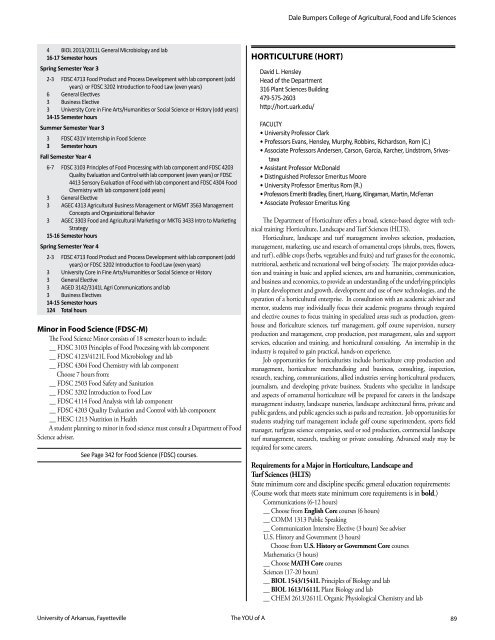PDF of 2011-12 Catalog of Studies (5.1MB)
PDF of 2011-12 Catalog of Studies (5.1MB)
PDF of 2011-12 Catalog of Studies (5.1MB)
Create successful ePaper yourself
Turn your PDF publications into a flip-book with our unique Google optimized e-Paper software.
Dale Bumpers College <strong>of</strong> Agricultural, Food and Life Sciences<br />
4 BIOL 2013/<strong>2011</strong>L General Microbiology and lab<br />
16-17 Semester hours<br />
Spring Semester Year 3<br />
2-3 FDSC 4713 Food Product and Process Development with lab component (odd<br />
years) or FDSC 3202 Introduction to Food Law (even years)<br />
6 General Electives<br />
3 Business Elective<br />
3 University Core in Fine Arts/Humanities or Social Science or History (odd years)<br />
14-15 Semester hours<br />
Summer Semester Year 3<br />
3 FDSC 431V Internship in Food Science<br />
3 Semester hours<br />
Fall Semester Year 4<br />
6-7 FDSC 3103 Principles <strong>of</strong> Food Processing with lab component and FDSC 4203<br />
Quality Evaluation and Control with lab component (even years) or FDSC<br />
4413 Sensory Evaluation <strong>of</strong> Food with lab component and FDSC 4304 Food<br />
Chemistry with lab component (odd years)<br />
3 General Elective<br />
3 AGEC 4313 Agricultural Business Management or MGMT 3563 Management<br />
Concepts and Organizational Behavior<br />
3 AGEC 3303 Food and Agricultural Marketing or MKTG 3433 Intro to Marketing<br />
Strategy<br />
15-16 Semester hours<br />
Spring Semester Year 4<br />
2-3 FDSC 4713 Food Product and Process Development with lab component (odd<br />
years) or FDSC 3202 Introduction to Food Law (even years)<br />
3 University Core in Fine Arts/Humanities or Social Science or History<br />
3 General Elective<br />
3 AGED 3142/3141L Agri Communications and lab<br />
3 Business Electives<br />
14-15 Semester hours<br />
<strong>12</strong>4 Total hours<br />
Minor in Food Science (FDSC-M)<br />
The Food Science Minor consists <strong>of</strong> 18 semester hours to include:<br />
__ FDSC 3103 Principles <strong>of</strong> Food Processing with lab component<br />
__ FDSC 4<strong>12</strong>3/4<strong>12</strong>1L Food Microbiology and lab<br />
__ FDSC 4304 Food Chemistry with lab component<br />
Choose 7 hours from:<br />
__ FDSC 2503 Food Safety and Sanitation<br />
__ FDSC 3202 Introduction to Food Law<br />
__ FDSC 4114 Food Analysis with lab component<br />
__ FDSC 4203 Quality Evaluation and Control with lab component<br />
__ HESC <strong>12</strong>13 Nutrition in Health<br />
A student planning to minor in food science must consult a Department <strong>of</strong> Food<br />
Science adviser.<br />
See Page 342 for Food Science (FDSC) courses.<br />
HORTICULTURE (HORT)<br />
David L. Hensley<br />
Head <strong>of</strong> the Department<br />
316 Plant Sciences Building<br />
479-575-2603<br />
http://hort.uark.edu/<br />
FACULTY<br />
• University Pr<strong>of</strong>essor Clark<br />
• Pr<strong>of</strong>essors Evans, Hensley, Murphy, Robbins, Richardson, Rom (C.)<br />
• Associate Pr<strong>of</strong>essors Andersen, Carson, Garcia, Karcher, Lindstrom, Srivastava<br />
• Assistant Pr<strong>of</strong>essor McDonald<br />
• Distinguished Pr<strong>of</strong>essor Emeritus Moore<br />
• University Pr<strong>of</strong>essor Emeritus Rom (R.)<br />
• Pr<strong>of</strong>essors Emeriti Bradley, Einert, Huang, Klingaman, Martin, McFerran<br />
• Associate Pr<strong>of</strong>essor Emeritus King<br />
The Department <strong>of</strong> Horticulture <strong>of</strong>fers a broad, science-based degree with technical<br />
training: Horticulture, Landscape and Turf Sciences (HLTS).<br />
Horticulture, landscape and turf management involves selection, production,<br />
management, marketing, use and research <strong>of</strong> ornamental crops (shrubs, trees, flowers,<br />
and turf), edible crops (herbs, vegetables and fruits) and turf grasses for the economic,<br />
nutritional, aesthetic and recreational well being <strong>of</strong> society. The major provides education<br />
and training in basic and applied sciences, arts and humanities, communication,<br />
and business and economics, to provide an understanding <strong>of</strong> the underlying principles<br />
in plant development and growth, development and use <strong>of</strong> new technologies, and the<br />
operation <strong>of</strong> a horticultural enterprise. In consultation with an academic adviser and<br />
mentor, students may individually focus their academic programs through required<br />
and elective courses to focus training in specialized areas such as production, greenhouse<br />
and floriculture sciences, turf management, golf course supervision, nursery<br />
production and management, crop production, pest management, sales and support<br />
services, education and training, and horticultural consulting. An internship in the<br />
industry is required to gain practical, hands-on experience.<br />
Job opportunities for horticulturists include horticulture crop production and<br />
management, horticulture merchandising and business, consulting, inspection,<br />
research, teaching, communications, allied industries serving horticultural producers,<br />
journalism, and developing private business. Students who specialize in landscape<br />
and aspects <strong>of</strong> ornamental horticulture will be prepared for careers in the landscape<br />
management industry, landscape nurseries, landscape architectural firms, private and<br />
public gardens, and public agencies such as parks and recreation. Job opportunities for<br />
students studying turf management include golf course superintendent, sports field<br />
manager, turfgrass science companies, seed or sod production, commercial landscape<br />
turf management, research, teaching or private consulting. Advanced study may be<br />
required for some careers.<br />
Requirements for a Major in Horticulture, Landscape and<br />
Turf Sciences (HLTS)<br />
State minimum core and discipline specific general education requirements:<br />
(Course work that meets state minimum core requirements is in bold.)<br />
Communications (6-<strong>12</strong> hours)<br />
__ Choose from English Core courses (6 hours)<br />
__ COMM 1313 Public Speaking<br />
__ Communication Intensive Elective (3 hours) See adviser<br />
U.S. History and Government (3 hours)<br />
Choose from U.S. History or Government Core courses<br />
Mathematics (3 hours)<br />
__ Choose MATH Core courses<br />
Sciences (17-20 hours)<br />
__ BIOL 1543/1541L Principles <strong>of</strong> Biology and lab<br />
__ BIOL 1613/1611L Plant Biology and lab<br />
__ CHEM 2613/2611L Organic Physiological Chemistry and lab<br />
University <strong>of</strong> Arkansas, Fayetteville The YOU <strong>of</strong> A<br />
89












